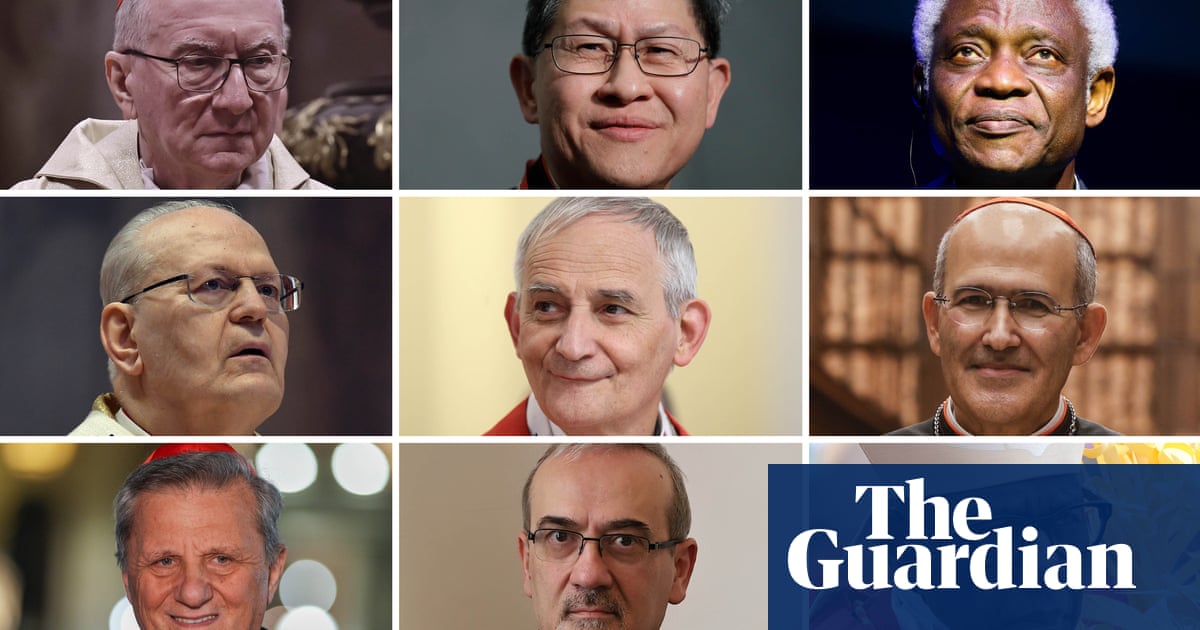Predicting the outcome of thehighly secretive papal conclaveis near impossible as cardinals’ positions shift over successive votes and some try to game the system to influence the chances of their favoured – or least-favoured – candidates. In the last conclave in 2013, few predicted that Jorge Mario Bergoglio would be elected as Pope Francis. At the moment, speculation is focusing on these men to succeed him:
Seen as a moderate “continuity candidate”, Parolin was close to Francis. He has been the Vatican’s secretary of state since 2013, playing a key role in diplomatic affairs, including delicate negotiations with China and governments in the Middle East. He is regarded as a reliable and trusted papal representative by secular diplomats. In 2018, he was the driving force behind acontroversial agreementwith the Chinese government on the appointment of bishops, criticised by some as a sellout to the communist regime. Parolin’s critics see him as a modernist and a pragmatist who places ideology and diplomatic solutions above hard truths of the faith. To his supporters, he is a courageous idealist and avid proponent of peace.
Tagle, a former archbishop of Manila, would be the first Asian pope, the region with the fastest-growing Catholic population. At one time he was considered to be Francis’s preferred successor and a strong contender to continue the late pope’s progressive agenda, but recently appears to have fallen out of favour. He has suggested that the Catholic church’s stance on gay and divorced couples is too harsh, but has opposed abortion rights in the Philippines.
Turkson would be the first black pope in centuries. He has been vocal on issues such the climate crisis, poverty and economic justice while affirming the church’s traditional positions on the priesthood, marriage between a man and a woman, and homosexuality. However, his views on the latter have loosened and he has argued that laws in many African countries are too harsh. He has spoken out on corruption and human rights.
A leading conservative candidate, Erdő has been a strong advocate for traditional Catholic teachings and doctrine. He would represent a big shift away from Francis’s approach. He is widely regarded as a great intellect and a man of culture. Erdő was a favourite of the late cardinalGeorge Pellwho believed he would restore the rule of law in the post-Francis Vatican. In 2015, Erdő appeared to align himself with Hungary’s nationalist prime minister, Viktor Orbán, when he opposed Francis’s call for churches to take in migrants.
Appointed a cardinal by Francis in 2019, Zuppi is considered to be on the progressive wing of the church, and would be expected to continue Francis’s legacy, sharing the late pope’s concern for the poor and marginalised. He is (relatively) liberal on same-sex relationships. Two years ago, Francis made him theVaticanpeace envoy for Ukraine, in which capacity he visited Moscow to “encourage gestures of humanity”. While there he met Patriarch Kirill, the leader of the Russian Orthodox church and Vladimir Putin’s ally. He has also met Volodymyr Zelenskyy, Ukraine’s president.
Tolentino is one of the youngest potential successors to Francis, which could count against him – ambitious cardinals may not want to wait another 20 or 30 years before another shot at the top job. He has attracted controversy for sympathising with tolerant views on same-sex relationships and allying himself with a feminist Benedictine sister who favours women’s ordination and is pro-choice. He was close to Francis on most issues, and argues that the church must engage with modern culture.
Grech was seen as a traditionalist but began to embrace more progressive views after Francis was elected in 2013. His supporters argue that his changing opinions show his capacity for growth and change. He has criticised European political leaders who sought to limit the activities of NGO ships and has expressed support for female deacons.
Since 2020, Pizzaballa has been the Latin patriarch of Jerusalem, a crucial role in advocating for the Christian minority in the Holy Land. After Hamas’s attack on Israel on 7 October 2023, Pizzaballaoffered himself as a hostagein exchange for children who were being held by Hamas in Gaza. He visited Gaza in May 2024 after months of negotiations. He would be expected to continue some aspects of Francis’s leadership of the church, but has made few public statements on controversial issues.
Sarah is a traditional, Orthodox cardinal who at one time sought to present himself as a“parallel authority”to Francis, according to a Vatican observer. In 2020, he co-authored a book with the then retired Pope Benedict defending clerical celibacy that was seen as a challenge to Francis’s authority. He has denounced “gender ideology” as a threat to society, and has spoken out against Islamic fundamentalism. Like Tagle, he could make history as the first black pope in centuries.
